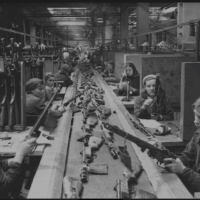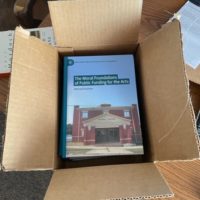I have a chapter on dynamic pricing in my old book. In a nutshell: dynamic pricing is where the seller adjusts the current price upwards or downwards based upon the most recent information on market conditions. This is not the same as a cinema having discount Tuesdays, since it will offer that each week as a result of known factors about the demand for tickets. Dynamic pricing is where you make changes on the go, where the price change might be up or down, depending. I suggested in the book that while airlines and hotels are pretty good at … [Read more...]
Museums are not like highways
In a New York Times op-ed, Laura Raicovich and Laura Hanna call for a generous increase in the way the government, in particular the federal government, funds arts institutions: As policymakers in Washington gather to draft a new budget for fiscal year 2025, they could solve culture’s current financial crisis and radically reshape how we think about sustaining the arts. They could do this by tapping into abundant appropriations that already enjoy bipartisan support. To make this possible, first we need to stop treating museums, theaters and … [Read more...]
Economic impact / Job creation arguments for public policy are terrible, episode 647.
Reasonable people can disagree on the amount of military support the US ought to give to Ukraine. But no reasonable person can think that the costs of this are actually benefits in terms of spending and US job creation. The benefit to the public of the arts is the arts, not the money that we spend on the arts. The benefit to the public of aid to Ukraine is the aid to Ukraine, not the money that was spent on providing that aid. … [Read more...]
On elites, and public subsidies for the high arts
We had a lively and sometimes contentious discussion earlier today - it will appear on YouTube at some point, I will post it then. In the meantime, a condensed version... … [Read more...]
Please join us for a discussion of the Moral Foundations of Public Funding for the Arts: Updated, now with video
One week from today, Wednesday October 18, at noon eastern time, my colleague Dr. Joanna Woronkowicz will be interviewing me, and taking questions, on my recently published book, as part of the Center for Cultural Affairs workshop series (we meet every two weeks via Zoom, for the latest in arts management and policy research). It's free to register - please join us! UPDATE: Here is the video - I really enjoyed the discussion … [Read more...]
Museums are not expensive
New Yorkers who are interested in seeing the film Barbie at the local multiplex will pay $25.49 per ticket. If, on the same weekend, they wish to also see Oppenheimer, as I read, in about one hundred and forty-seven news reports, people were doing, then we are up to $51. If baseball is more your thing, $30.80 will put you in the highest tier right field bleachers to watch the rather mediocre Yankees take on the Tampa Bay Rays tonight. Many people will do these things. The New York Times reports on major big-city museums raising their single … [Read more...]
What’s Wrong with the Theatre is What’s Wrong With Society
In the New York Times, Isaac Butler sounds the alarm for the fate of live theatre in the US: The American theater is on the verge of collapse. ... Regional and nonprofit theaters were in trouble well before 2020 and the force majeure of the pandemic. Most regional and nonprofit theaters were built on a subscription model, in which loyal patrons paid for a full season of tickets upfront. Foundation grants, donations and single ticket sales made up the balance of the budgets. For much of the 20th century, this model worked. It locked … [Read more...]
Producing and exhibiting arts as a nonprofit entity is a qualified tax exempt activity
Here's what the Internal Revenue Service says: Organizations organized and operated exclusively for religious, charitable, scientific, testing for public safety, literary, educational, or other specified purposes and that meet certain other requirements are tax exempt under Internal Revenue Code Section 501(c)(3). Organizations whose primary focus is literary or educational are exempt from the corporate income tax (they are also typically exempt from state property taxes, but that is a state government matter). An orchestra or museum … [Read more...]
The real thing
For all the stages an author experiences in seeing the draft of a manuscript through edits and proofreads, nothing really matches the day you receive delivery of a box of hard copies. Details are here. The cover is a nod to the Hoosier state, who a hundred years ago or so decided that towns, even small ones, ought to have some place to gather to hear talks and enjoy performances. … [Read more...]
What classic movie best captures the USA right now? Breaking Away, obvs…
The New York Times asked 17 columnists to choose a single work. Maureen Dowd chose Invasion of the Body Snatchers, David French chose Arrival (great film, though I'm not entirely convinced as an answer to this question. But, and truly this is not hometown bias, the winner is a 1979 film that saw coming the divides that curse us in 2023. I reckon Mike is in his early 60s around now. … [Read more...]










